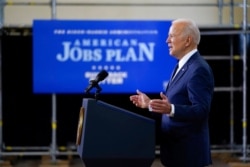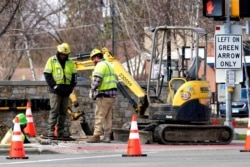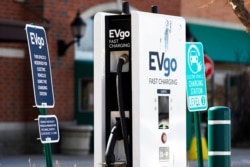President Joe Biden’s plan announced Wednesday to plow $2 trillion into an eight-year overhaul of U.S. infrastructure was met with only limited carping from many voices normally critical of government spending. Meanwhile, economists expressed broad agreement that the plan, as proposed, would power long-run economic growth.
It is certainly possible that pumping that much money into the economy, with interest rates near zero and a nascent recovery already taking shape, could cause inflation, said Mark Hamrick, senior economic analyst for Bankrate.com.
However, he said, “The other part of the discussion is, there's clearly a huge risk from failing to address infrastructure needs. And I think most people would say that [inflation] is a risk worth taking at this point.”
The proposal outlined by Biden in Pittsburgh would direct $620 billion in funding to transportation infrastructure, $300 billion to boost manufacturing, $180 billion to research and development focused on climate-science research, $174 billion to accelerate the use of electric vehicles, and hundreds of billions more to a laundry list of smaller-ticket priorities.
All of this massive spending is only the first half of what officials say will be a two-part effort to invest in the country’s future, with the second piece expected next month. The elements of the Biden plan announced Wednesday would be paid for by increasing taxes on U.S. businesses, while the next round of proposals would be paid for by increasing taxes on wealthy individuals.
Public sector criticism largely muted
It is a testament to the widespread agreement on the need for infrastructure investment that even groups adamantly opposed to Biden’s plan to pay for it with a tax increase or concerned about the possibility of inflation were quick to praise the proposal’s breadth and ambition.
“We need a big and bold program to modernize our nation’s crumbling infrastructure and we applaud the Biden administration for making infrastructure a top priority,” said Neil Bradley, executive vice president and chief policy officer of the U.S. Chamber of Commerce, in a statement released by the organization. “However, we believe the proposal is dangerously misguided when it comes to how to pay for infrastructure.”
In an analysis of the plan, Michael R. Strain, the director of economic policy studies at the conservative American Enterprise Institute, called it “admirably ambitious” even as he expressed concern about the way it was being paid for and worried about inflation.
“Much of the debate about the infrastructure plans will focus on whether there is political space for another multitrillion-dollar bill,” he wrote. “I am worried about whether there is economic space."
Too much economic juice?
Strain said that a surge in spending this year and next, temporarily fueled by debt while the tax revenue was collected, could combine with the $1.9 trillion spending in the American Rescue Plan to drive inflation.
“Can the economy handle a temporary deficit boost this year and next? That will depend on whether the $1.9 trillion stimulus law Biden just signed pushes the economy too hard, leading to consumer price inflation, higher interest rates and financial instability. I am worried that it will,” Strain said.
However, the majority of economic analysts seemed more concerned about what might happen if the administration failed to act.
“Most economists are in agreement that the costs will be paid back in the economic productiveness of the expenditures, at least in their totality, if indeed it were to be passed as proposed,” said Hamrick of Bankrate.com. “There's an economic cost to the lack of investment, not only in infrastructure, but these other areas as well. And that needs to be part of the central argument. There's a cost to not doing it. And there's a benefit to doing it.”
Inflation? So what?
“It's important to recognize that if the plan works as intended, it should increase the productive capacity of the economy,” said David Wilcox, a senior fellow at the Peterson Institute for International Economics. “We're paying real costs today for our inadequate investment in infrastructure. The investments that are made under this plan should help alleviate some of the bottlenecks in the American economy, and that itself will provide a bit of a pressure relief valve against some of the concerns that have been expressed.”
Wilcox, former director of the Federal Reserve Board’s domestic economics division and a senior adviser to three Fed chairs, said that Biden’s intention to pay for his infrastructure proposals with tax increases on the wealthy and on businesses should, by itself, “substantially diminish the potential for this plan by itself to contribute to any kind of worrisome overheating of the economy.”
He added that even if increased infrastructure investment triggered higher inflation, that wouldn’t necessarily be a bad thing.
"The Fed has indicated that it not only will tolerate but indeed welcome some additional inflation,” Wilcox said. “So all of that says to me that now is a good time to err on the side of providing more relief than it might turn out that American families and businesses actually need."
Mission not accomplished
Even though the U.S. economy has begun to spring back, with the unemployment rate falling sharply from alarming highs early in the pandemic, there are still 9.5 million fewer jobs in the country than there were when employment peaked near the beginning of the pandemic.
That’s about the number of job losses the U.S. suffered during the Great Recession.
“So the jobs deficit, as of today, remains huge,” Wilcox said. “We've got a very long way to go before anybody is going to unfurl the ‘Mission Accomplished’ banner on the economy being fully recovered.”
Political criticism
The most vocal critics of the Biden administration plan have been Republican leaders in Congress, who claim that the plan is a cover for Democratic priorities not related to infrastructure.
"It’s called infrastructure, but inside the Trojan horse it’s going to be more borrowed money, and massive tax increases on all the productive parts of our economy,” said Senate Minority Leader Mitch McConnell, echoing a criticism of the bill he has made many times in recent days, while speaking with reporters in his home state of Kentucky on Wednesday.
Wyoming Senator John Barrasso, who chairs the Senate Republican Conference, warned that Biden’s two-step infrastructure plan wasn’t really an infrastructure proposal at all.
"Infrastructure means highways, roads, bridges,” he said in an interview with Fox Business News on Tuesday. “They want to do all sorts of social things. They’re talking about free community college, free day care, free senior care and then, of course, the punishing regulations of the Green New Deal. And you add on that all the taxes, that they’re talking about taxes on individuals, taxes on businesses. And they’re trying to resurrect the death tax. The difference could not be more clear.”







